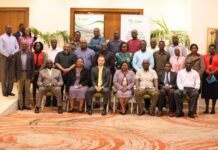By Bryn Galumbeck Marrakech
Since the International Year of Plant Health in 2020, the UN recognizes today, May 12th, as International Day of Plant Health (IDPH) to raise global awareness of how plant health contributes to food security, protects biodiversity and ecosystems, enhances economic development and reduces poverty.
Healthy plants provide a nutritious diet, contribute to soil fertility and prevent erosion, and create a robust agricultural sector and employment opportunities. Unhealthy plants, infected by pests and diseases, significantly reduce global crop yields by nearly 40% annually and induce outbreaks of zoonotic diseases. This has devastating effects, undermining food security, reducing biodiversity, and causing significant economic losses.
Pest and disease outbreaks, driven by climate change and globalization, are rising worldwide. Climate change alters temperatures and rainfall patterns, enabling pests and pathogens to expand into new regions and evolve more rapidly, while globalization and international trade accelerate the movement of invasive species across continents. These factors have led to an increase in both the frequency and severity of outbreaks, threatening staple crops and natural ecosystems. In Morocco, for example, the prickly pear cactus, an important crop for food, income, and soil conservation, has been devastated by the invasive wild cochineal insect (Dactylopius opuntiae), highlighting the urgent need for vigilant plant health management.
Since its founding, the High Atlas Foundation (HAF) has prioritized tree planting as a cornerstone of its sustainable development mission. What began as the organization’s first project has since expanded into a nationwide initiative with nine nurseries located across eight provinces in Morocco. With a current annual capacity of three million saplings and nine tree varieties, HAF focuses on long-term ecological impact—trees with lifespans exceeding 50 years. HAF supports the entire lifecycle of tree planting: from cutting and cultivation in nurseries, to distribution to smallholder farmers, and finally, to on-site monitoring and support.
HAF’s dedicated team of 13 monitoring officers liaises with farmers to assess local needs, coordinate sapling delivery, and ensure trees are planted in suitable conditions. Mohammed El Kadiri, recently promoted to Programme Coordinator, reflected, “As a monitoring officer, I distributed around 700,000 trees in just four years.” Overall, tree distribution has steadily increased, from 700,000 in 2022 to over 1.2 million in 2024.
With the rising spread of pests and disease in Morocco, plant health is a top priority for HAF’s tree planting programme. Monitoring is a key strategy to prevent disease outbreaks. Two to three months after distribution, monitoring officers return to assess tree health and provide technical advice on planting, irrigation, and care. To strengthen this process, HAF recently implemented a digital tracking system using Kobo Toolbox, which collects and analyzes data on over 400,000 trees, providing insights on species performance, land use, and farming practices. Early findings show a tree survival rate of 76–81%, a promising indicator of long-term success. Tracking and following up with nurseries and farmers ensure disease prevention now and in the future.
In addition to regular monitoring practices, officers work closely with agricultural technicians to advise farmers on pest and disease management, with a special emphasis on agroforestry. Amina El Hajjami, Programme Director, highlighted the importance of these practices, noting, “We always encourage agroforestry to prevent disease. If one plant is affected, it can spread quickly across thousands of hectares, and farmers risk losing everything, both the plant and the product.” Beyond reducing the risk of disease and pest outbreaks, agroforestry also improves soil health, biodiversity, and water management, helps mitigate climate change, and supports local communities by increasing productivity and creating jobs.
On this International Day of Plant Health, we celebrate initiatives like monitoring and agroforestry that actively promote healthy plants. Through collective action and innovative solutions, we can build resilient landscapes and thriving communities.
Bryn Galumbeck is a volunteer at HAF, first introduced through the University of Virginia’s global internship programme in 2020. Passionate about women’s empowerment and economic development, she advocates for sustainable solutions that drive social, economic, and environmental impact.









